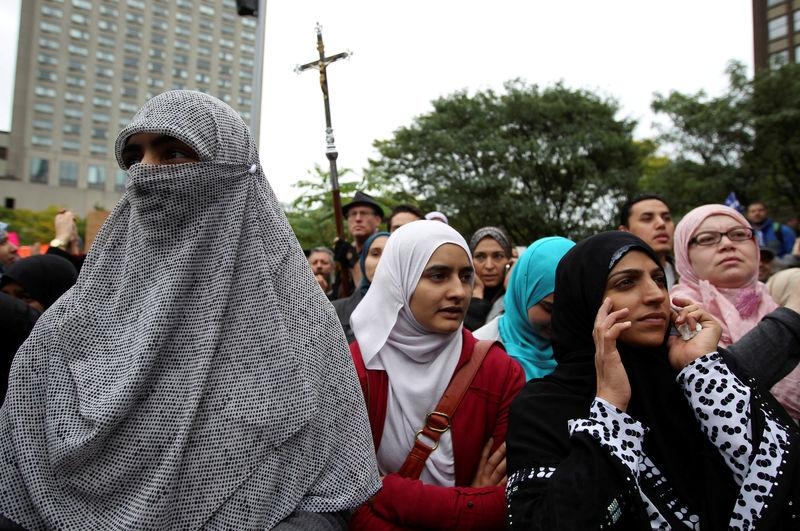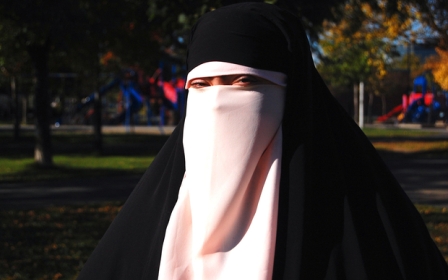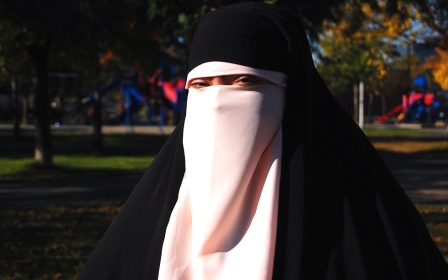Quebec Niqab ban part suspended by Canadian judge

A Canadian judge has stayed parts of a controversial Quebec law banning full-face veils in public spaces in a victory for civil liberties groups that had mounted a court challenge.
Judge Babak Barin suspended the part of the act banning face coverings for anyone working in or accessing public services, on the grounds that it was unconsitutional and discriminated against Muslims.
The judge has asked for the government to enact guidelines for how the law will be applied and how exemptions might be granted.
Quebec's government passed Bill 62 in October, arguing that it was designed to address public safety and was religiously neutral because masked protesters would also be affected.
"We are just saying that for reasons linked to communication, identification and safety, public services should be given and received with an open face,” Philippe Couillard, the premier of Quebec, told Reuters in October.
"We are in a free and democratic society. You speak to me, I should see your face, and you should see mine. It's as simple as that."
Critics have said that the law unfairly targets the minority of Muslim women in Quebec who wear the niqab and the burqa, full-face veils. Some have suggested that such Muslims would be unable to access public services such as transport systems, health services or public libraries.
Second-class citizens
The court challenge against the bill was filed by a coalition of Muslim and civil rights advocates, and Warda Naili, a Quebec woman who converted to Islam and wears a niqab.
The judge "recognised the immediate harm the law was causing to the people it affects outweighed any theoretical public purpose of the law," lawyer Catherine McKenzie, who represents Naili, told Reuters.
In October, Naili told MEE that she had already been abused for wearing the niqab in public and that the bill made her feel like a second-class citizen.
“It's already difficult what we're living. We're already living [through] threats and insults. Now this will increase the aggressiveness" of members of the public who are against the niqab in general, she said.
The National Council for Canadian Muslims welcomed the ruling "as a successful first step," its executive director Ihsaan Gardee said.
Quebec's Liberal government is defending the law in court, saying it does not discriminate against Muslim women and is necessary for reasons of security, identification and communication. The act's name refers to "religious neutrality" and "accommodations on religious grounds".
"I'm not unsatisfied with the judgment because there's no mention that the law contravenes the charters [of rights]," Couillard told reporters on Friday, as quoted by the Canadian Broadcasting Corp.

The bill has also pitted the regional Quebec government against Canadian Prime Minister Justin Trudeau who said in October that his government was looking into the legislation.
"I don’t think it's the government’s business to tell a woman what she should or shouldn't be wearing," the prime minister was quoted by the Guardian as saying. "As a federal government, we are going to take our responsibility seriously and look carefully at what the implications are."
Quebec had about 243,000 Muslims out of a population of 8 million, according to the 2011 census.
In January a gunman walked into a Quebec City mosque and shot six people dead. A French-Canadian university student has been charged as the sole suspect.
France, Belgium, the Netherlands, Bulgaria and the German state of Bavaria have imposed restrictions on the wearing of full-face veils in public places. Denmark plans to institute its own ban.
New MEE newsletter: Jerusalem Dispatch
Sign up to get the latest insights and analysis on Israel-Palestine, alongside Turkey Unpacked and other MEE newsletters
Middle East Eye delivers independent and unrivalled coverage and analysis of the Middle East, North Africa and beyond. To learn more about republishing this content and the associated fees, please fill out this form. More about MEE can be found here.




